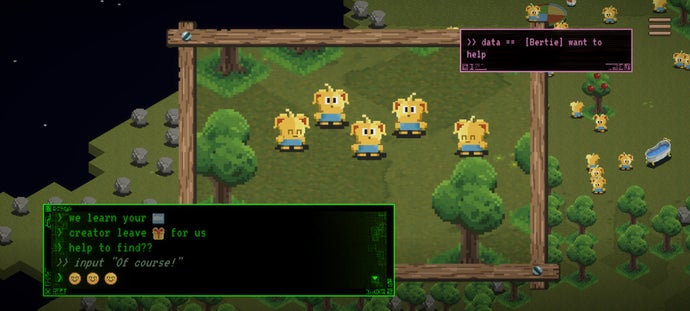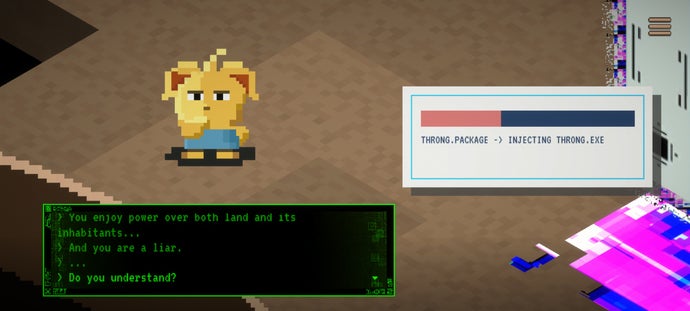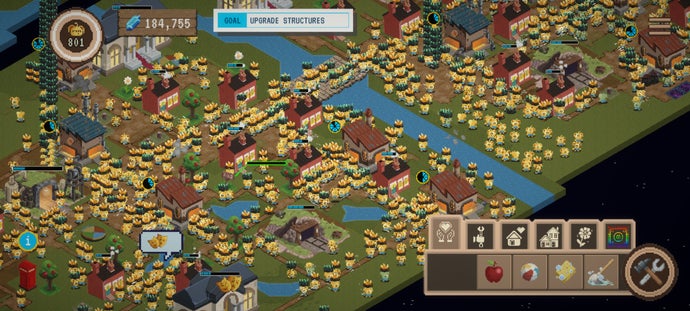Black Mirror is at it again. Several years ago, Bandersnatch, a special spin-off episode of the anthology series, which tells dark, cautionary tales about the use of technology, turned heads for putting interactivity directly in a TV show. You were able to, by using simple either-or choices, choose which path the story took, to a degree. What was clever about it was how the function mirrored form, as the episode itself followed the creation of a game offering a similar kind of choice – or an illusion of choice, as the case turned out to be. There were many meta layers to it. And now an episode in the brand new series of Black Mirror, released on Netflix this week, is trying to do a similar thing.
Sort of.
The episode in question is Plaything, which stars Peter Capaldi as a scraggly suspect in a murder case, one which has links to an unusual video game made during the 1990s. The episode revolves around Capaldi’s character’s statement and life story, as we flash back to the 1990s, when he was working as a video game journalist for magazine PC Zone, just as Black Mirror creator and episode writer Charlie Brooker once did. His life takes a dramatic turn when he’s asked to preview his idol Colin Ritman’s new game.
If the Ritman name sounds familiar that’s because it is. Ritman was in Bandersnatch, where he was also idolised by the main character, and he’s played by the same actor again, Will Poulter (who was excellent in the prescription drug-focused series Dopesick, in case you haven’t seen it). There’s so much about the set-up of Plaything that’s similar: Tuckersoft is once again the fictional game developer at the heart of the story, only this time it’s depicted in the early 90s rather than the 80s, and hallucinogenic drugs play a catalytic role in the plot again. The major difference is the game around which everything revolves.
Ritman has been working on an ambitious new game called Thronglets, which is what Capaldi’s character takes us – the viewer – along with him to see. It’s a kind of god sim with tamagotchi ideas. In it, creatures called Thronglets pop into being and need caring for, and if done well, they will multiply. Then… things happen, but I don’t want to say too much for fear of spoiling it. But because the concept is different to a choose your own adventure, like Bandersnatch was, so is the game idea surrounding the episode.
A companion mobile game, that’s the idea this time, which I know doesn’t sound very exciting but actually, there’s a neat concept here – it’s a far cry from the Fall Guys-style party game Netflix put out for Squid Game 2. The concept is that the Thronglets mobile game is the same game that’s in the Black Mirror show. Like, exactly the same. Both were designed alongside each other, Charlie Brooker told mobilegamer.biz, and both influenced each other. Brooker was involved with making it, too, working with the talented Oxenfree studio Night School over a considerable development period of a year-and-a-half.



The gist of the game – and I’m trying to be careful of spoilers here – is that your Thronglets treat you as a kind of god (there are heavy 90’s god sim vibes here; it reminds me a lot of Peter Molyneux and Lionhead’s Black & White) and both learn from your actions as you play and by asking questions of you – deep, philosophical, ‘what is life?’ questions. This is all very in keeping with the Plaything episode of the Black Mirror show. What’s less in keeping with the show are the Cookie Clicker-like resource-harvesting tasks you’ll have to fulfil, I presume because we now need something to actually play. But they fulfil a broadly similar purpose to the Thronglets game in the show, of making increasing demands of you, and they’re only really employed across one level in the few hours the game lasts, so they don’t overstay their welcome.
The mechanics are so-so, then, but what’s really enjoyable about the game – as in the Black Mirror TV show – is the self-referential meta commentary running through it. Every time a Thronglet comes to you with a question, there’s a humorous outcome, either as you struggle to answer what they ask, or because of how they interpret what you say. And the choices you make are remembered, reflected back at you when a level ends or brought up by the Thronglets later down the line. It’s an impressive little package. I could imagine the game turning heads even if it weren’t linked to the Black Mirror TV show.
But where it really impresses is in how it takes you a layer deeper into an episode of a TV show and allows you to experience the central concept of it – the game – for yourself. We’ll never quite experience it in the same way Capaldi’s character does, for reasons, but in Thronglets, Night School, Brooker and Netflix have done a good job creating something similar and enjoyable too.
I do have one issue with Thronglets, though: it’s a mobile game separated from the episode of TV itself. Bandersnatch and its interactive concept were welded together – a kind of gaming interactivity Netflix turned sharply away from last year – which meant there was no way to experience one without the other. But it’s different with Plaything and Thronglets. It’s not clear that there’s an accompanying game at all, after you finish watching the episode – it’s not signposted from there. You have to go specifically to the Netflix Mobile Games section to find it or see it advertised on the Mobile Games carousel. It speaks to a larger discoverability issue Netflix has with games in general: that people don’t necessarily go there looking for them. I suppose Thronglets is a part of its solution, made to encourage people to play games there, but it’s currently sitting in a catch-22 grey area and I fear it’ll be overlooked. And that’s a shame, because Thronglets, to me, feels like the gaming future Netflix wants. It’s a fine example of how an additive brand-related gaming experience can be done.
